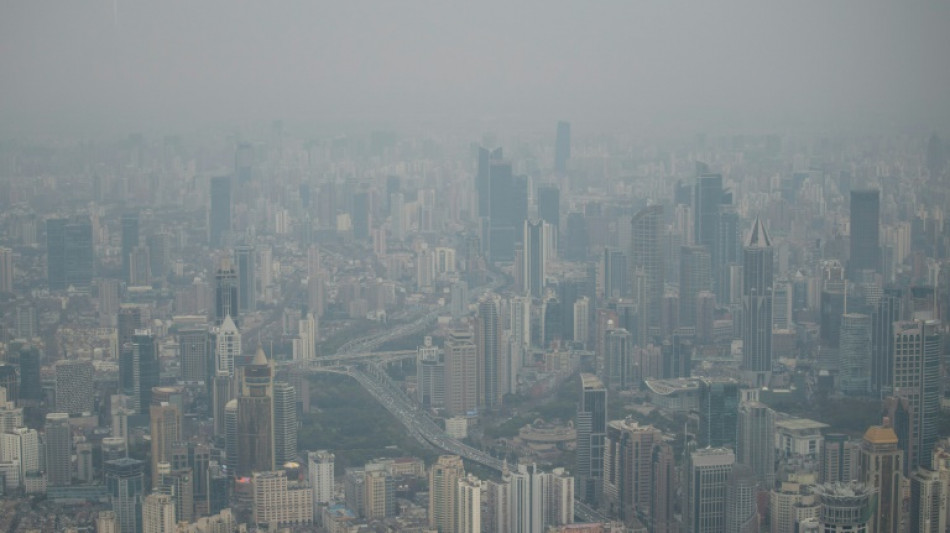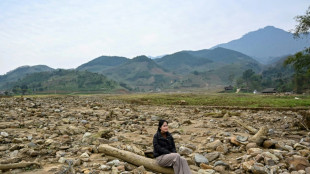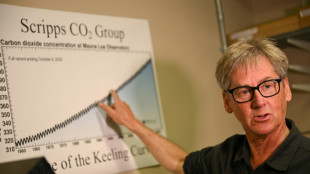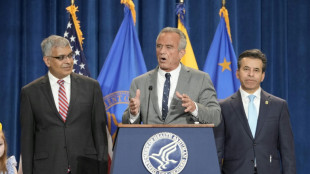
-
 Champions League spot would be 'Premier League trophy' for Man City: Nunes
Champions League spot would be 'Premier League trophy' for Man City: Nunes
-
Abbas urges Hamas to free Gaza hostages as Israeli strikes kill 18

-
 Stocks rally as Trump soothes fears over China trade, Fed
Stocks rally as Trump soothes fears over China trade, Fed
-
French PM's daughter says priest beat her as a teenager

-
 Tens of thousands say goodbye to Pope Francis lying in state
Tens of thousands say goodbye to Pope Francis lying in state
-
EU slaps fines on Apple and Meta, risking Trump fury

-
 Gaza rescuers recover charred bodies as Israeli strikes kill 17
Gaza rescuers recover charred bodies as Israeli strikes kill 17
-
Tourists flee India-administered Kashmir after deadly attack

-
 China says 'door open' to trade talks after Trump signals tariffs will fall
China says 'door open' to trade talks after Trump signals tariffs will fall
-
WEF confirms investigation into claims against founder Schwab

-
 Pilgrims flock to pay tribute to pope lying in state
Pilgrims flock to pay tribute to pope lying in state
-
Stocks rally as Trump comments ease Fed, China trade fears

-
 Muzarabani takes six as Bangladesh set Zimbabwe 174 to win
Muzarabani takes six as Bangladesh set Zimbabwe 174 to win
-
PM faces first test as Singapore election campaign kicks off

-
 Patients with leprosy face lasting stigma in Ethiopia
Patients with leprosy face lasting stigma in Ethiopia
-
Still reeling a year on, Brazil's Porto Alegre fears next flood

-
 Lakers level NBA playoff series, Pacers and Thunder win again
Lakers level NBA playoff series, Pacers and Thunder win again
-
At night, crime and fear stalk DR Congo's M23-run areas

-
 Embalming and make-up: Pope's body prepared for lying-in-state
Embalming and make-up: Pope's body prepared for lying-in-state
-
Prosecutors to make case against Harvey Weinstein at retrial

-
 Coral reefs pushed to brink as bleaching crisis worsens
Coral reefs pushed to brink as bleaching crisis worsens
-
Vietnam village starts over with climate defences after landslide

-
 'Happiness, love' at Moonie mass wedding after Japanese court blow
'Happiness, love' at Moonie mass wedding after Japanese court blow
-
Veteran Chinese astronaut to lead fresh crew to space station

-
 Pilgrims gather as Pope Francis begins lying in state
Pilgrims gather as Pope Francis begins lying in state
-
Asian markets rally as Trump comments ease Fed, China trade fears

-
 Saudi 'city of roses' offers fragrant reminder of desert's beauty
Saudi 'city of roses' offers fragrant reminder of desert's beauty
-
Trump says won't fire Fed chief, signals China tariffs will come down

-
 India hunts gunmen who massacred 26 in Kashmir tourist hotspot
India hunts gunmen who massacred 26 in Kashmir tourist hotspot
-
'No one else will': Sudan's journalists risk all to report the war

-
 UK hosts new round of Ukraine talks
UK hosts new round of Ukraine talks
-
Trial testimony reveals OpenAI interest in Chrome: reports

-
 Tokyo's newest art star: one-year-old Thumbelina
Tokyo's newest art star: one-year-old Thumbelina
-
Ronaldo hunts Asian Champions League glory in Saudi-hosted finals

-
 Scientists sound alarm as Trump reshapes US research landscape
Scientists sound alarm as Trump reshapes US research landscape
-
Trump's return boosts Israel's pro-settlement right: experts

-
 Trump solo: first lady, children out of frame in new term
Trump solo: first lady, children out of frame in new term
-
Climate watchers fret over Trump's cut to sciences

-
 Moving fast and breaking everything: Musk's rampage through US govt
Moving fast and breaking everything: Musk's rampage through US govt
-
'Everyday attack' - Trans youth coming of age in Trump's America

-
 A stadium and a jersey for Argentina's 'Captain' Francis
A stadium and a jersey for Argentina's 'Captain' Francis
-
New Trump task force vows to root out 'anti-Christian bias'

-
 96.com Congratulates Burnley FC on Premier League Promotion
96.com Congratulates Burnley FC on Premier League Promotion
-
Auto Shanghai showcases new EV era despite tariff speedbumps

-
 Trump's administration moves to scrap artificial food dyes
Trump's administration moves to scrap artificial food dyes
-
Musk to reduce White House role as Tesla profits plunge

-
 US official backs off promise to solve cause of autism by September
US official backs off promise to solve cause of autism by September
-
Guardiola joy as Man City go third after dramatic win over Villa

-
 Trump says has 'no intention' of firing Fed chief
Trump says has 'no intention' of firing Fed chief
-
Jury finds New York Times did not libel Sarah Palin


Ozone pollution linked to increased heart disease: study
Ozone air pollution is linked to a higher rate of hospitalisations for heart diseases, according to a large study released Friday, the latest warning of the health dangers posed by greenhouse gases.
While a layer of ozone in the upper atmosphere helps block harmful ultraviolet (UV) radiation from reaching Earth, at ground level it is a major component of the smog polluting most big cities.
Scientists have warned that a different kind of air pollution, fine particulate matter known as PM2.5, causes 8.8 million premature deaths a year, but ozone's full impact on health is still becoming clear.
Ozone is created in the atmosphere by a chemical reaction when two pollutants, often emitted by cars or industry, combine in the presence of sunlight, and has been shown to interfere with plant photosynthesis and growth.
The new study said it was the first to evaluate the risk of hospitalisation for heart disease when ozone levels rise above the World Health Organization's daily guideline of 100 microgrammes per cubic metre of air.
For the study, published in the European Heart Journal, a team of China-led researchers looked at data on hospital admissions from 2015 to 2017 in 70 Chinese cities collected for health insurance purposes.
The data covered 258 million people across 70 cities, representing roughly 18 percent of China's population.
The researchers compared the hospitalisations to air quality data tracked in real-time across the cities.
It found that -- independent of other pollutants -- ozone was associated with more than three percent of hospitalisations for coronary heart disease, heart failure and stroke.
Also, each increase of 10 microgrammes of ozone per cubic metre of air was linked to a 0.75 percent rise in hospitalisations for heart attacks, and to a 0.40 percent increase for stroke.
"Although these increments look modest," the impact would be "amplified by more than 20 times" when ozone levels soar above 200 microgrammes in the summer, study author Shaowei Wu of Xi'an Jiaotong University and his colleagues told AFP.
In this extreme example, ozone exposure would be linked to 15 percent of heart attacks and eight percent of strokes, the researchers said.
- Key for health, climate -
The researchers called for more aggressive action to reduce the consumption of fossil fuels, as well as a warning system so people could limit their exposure on high ozone days.
Because the study was observational, it was not able to directly show that ozone pollution causes heart disease.
But Chris Malley, an air pollution researcher at York University n Britain, who was not involved in the study, said it added to a growing "weight of evidence that there is a causal relationship".
In 2017, research led by Malley that estimated that ozone pollution was linked to more than one million deaths a year from respiratory disease.
"If cardiovascular disease were added to this total, then the health burden would be substantially higher than we estimated," Malley told AFP.
"Ozone is not just a threat to human health, it also has a large part to play in climate change," he added.
"Taking action to reduce ozone is therefore a key way to improve public health and combat climate change at the same time."
S.Keller--BTB


